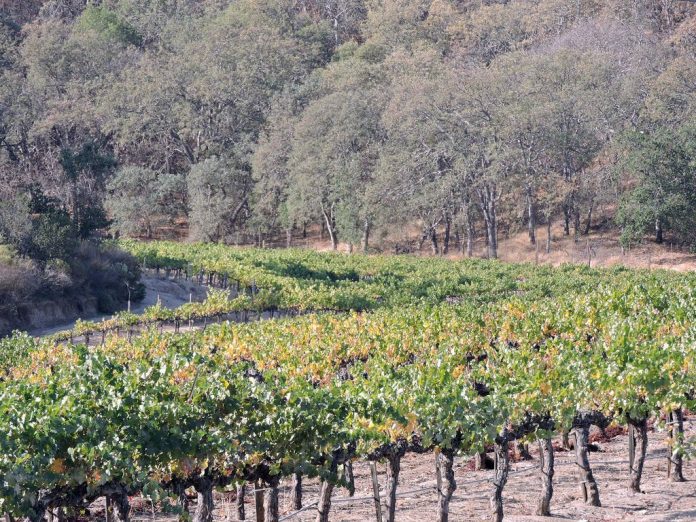A cool breeze rustled through the trees surrounding DeRose Vineyard’s tasting room when I walked up on a Saturday morning. Pat DeRose, owner and winemaker, had just pulled up to the door in an old, gray pickup that showed signs of years spent out in the vineyards.
Pat led me into a dark tasting room filled with stainless steel tanks, open fermenting barrels and large grape-crushing and de-stemming machines. He went behind the bar to prepare for the day of tasting while telling me about how this particular location affects the grapes that are grown here.
Located high in the Gabilan Mountains in Cienega Valley, with elevations more than 1,100 feet, DeRose has a fairly cool growing climate.
“We’re a late season region. We ripen later than most regions,” Pat said.
Even before you arrive at DeRose Vineyards you get a sense of history as you drive through miles of winding mountain roads, surrounded by land that has yet to be touched by commercialization.
“We ship out of state but there are a lot of local people in the Bay Area that come out here,” he said. “We’re a destination—you don’t just randomly stop on the side of the road.”
With Zinfandel vines that were planted in the late 1890s and Negrette vines that are more than 115 years old, DeRose Vineyards has a history unlike others in the area.
“We’re the oldest existing winery in California. There are wineries that could be older than us, but (they) either shut down or changed ownership,” Pat said. “We’ve never shut our doors since 1851.”
Pat’s love for making wines has been passed on to his son, Alphonse DeRose.
“I’m passing the torch on—he’s now the head winemaker,” Pat said.
After years spent watching his dad farm out in the vineyards, Alphonse pursued the study of enology and graduated from Fresno State University in 2001. Together, they now craft unique blends from the rare vines grown on the property.
With ancestors who made wine for more than 10 generations, Pat and his family decided to buy the winery in 1988.
“My son and I own the equipment and the inventory, but the property is owned by the entire family and there are 13 of us involved: the DeRose and Cedolini families,” he said.
When the winery was purchased, the vineyards had been abandoned for eight years.
“We had to rip wild rose bushes and poison oak out,” Pat said. “It took three years to clear all the rubble so we could get to the vines.”
There are 50 acres of vines and half of them are more than 100 years old—the other half are about 28 years old. Along with old vines, DeRose Vineyards is a historical landmark with the San Andreas Fault running through the property.
“Part of our vineyards are on one plate and part are on another,” Pat said. “The property moves about three centimeters a year.”
DeRose Vineyards uses all natural fermentation, which means no store-bought yeast, only native yeast produced during natural fermentation.
“Natural fermentation gives you more color and better flavor,” Pat said.
But that’s not the only way the winery uses nature.
“Everything in the winery is 100 percent run on solar panels. We’re very green-oriented here,” he said.
With California’s continued drought, having enough water for vines to produce at their full potential can be an issue.
“We’re 100 percent dry farm,” Pat said. “We don’t irrigate or water anything.” But with dry farming and very little rain, “our vines are producing somewhere in the 15 percent of their 100 percent—we’re going to have a short year.”
DeRose Vineyards produces approximately 5,000 to 7,000 cases of estate wines on a good year. Due to the drought, Pat estimates DeRose will produce about 700 cases this year
Luckily, it also imports about 4,000 cases from Chile, France, Italy, Spain and Argentina.
“My son goes to Chile several times a year and we make wine there,” Pat said. Alphonse has been the consulting winemaker for Bodega El Huique, located in central Chile, since 2002.
“People are really interested in wines from all over the world. People come in here looking for Italian wine and we have it,” Pat said. “We don’t buy anything we wouldn’t want to drink. There’s a certain style that we like and that’s big, bold wines with a lot of flavor.”
Visit DeRose Vineyards at 9970 Cienega Road, Hollister. Wine tasting is $5 a person for a taste of five to seven wines. During your visit, don’t leave without trying the bestseller—”Hollywood Red.” It is a red blend that carries many unique varietals, all grown in the vineyards—a 100-year-old Zinfandel, Négrette (DeRose grows some of the last known Négrette remaining in the world), Alicante Bouschet, Rose of Peru (Pat has never heard of anyone else growing this unique varietal—DeRose grows about an acre of it), Cabernet Pfeffer (Pat said, “We think there’s only 30 acres of it in the whole world”), Syrah and Cabernet Franc. For more information, call (831) 636-9143.
Chrissy Bryant is a writer, social media manager and former Morgan Hill native who loves staying active, enjoys California sunshine and a great glass of wine. This article is part of a series to complete a master’s degree project at San Jose State University.














